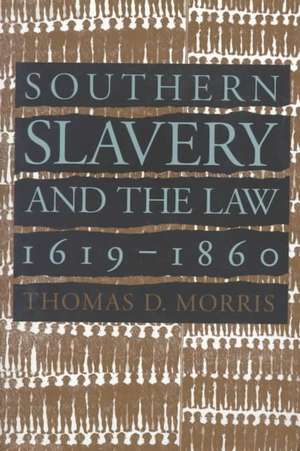Southern Slavery and the Law, 1619-1860: Studies in Legal History (Paperback)
Autor Thomas D. Morrisen Limba Engleză Paperback – 31 ian 1999
Din seria Studies in Legal History (Paperback)
-
 Preț: 312.52 lei
Preț: 312.52 lei -
 Preț: 342.25 lei
Preț: 342.25 lei -
 Preț: 345.72 lei
Preț: 345.72 lei -
 Preț: 302.89 lei
Preț: 302.89 lei -
 Preț: 308.27 lei
Preț: 308.27 lei -
 Preț: 351.72 lei
Preț: 351.72 lei -
 Preț: 308.83 lei
Preț: 308.83 lei -
 Preț: 308.45 lei
Preț: 308.45 lei -
 Preț: 317.31 lei
Preț: 317.31 lei -
 Preț: 394.77 lei
Preț: 394.77 lei -
 Preț: 463.63 lei
Preț: 463.63 lei -
 Preț: 305.39 lei
Preț: 305.39 lei -
 Preț: 314.81 lei
Preț: 314.81 lei -
 Preț: 315.02 lei
Preț: 315.02 lei -
 Preț: 397.07 lei
Preț: 397.07 lei -
 Preț: 307.68 lei
Preț: 307.68 lei -
 Preț: 270.60 lei
Preț: 270.60 lei -
 Preț: 429.67 lei
Preț: 429.67 lei - 23%
 Preț: 666.08 lei
Preț: 666.08 lei - 23%
 Preț: 665.33 lei
Preț: 665.33 lei -
 Preț: 326.25 lei
Preț: 326.25 lei -
 Preț: 340.50 lei
Preț: 340.50 lei -
 Preț: 441.43 lei
Preț: 441.43 lei -
 Preț: 327.17 lei
Preț: 327.17 lei -
 Preț: 440.29 lei
Preț: 440.29 lei -
 Preț: 309.80 lei
Preț: 309.80 lei -
 Preț: 325.44 lei
Preț: 325.44 lei -
 Preț: 326.62 lei
Preț: 326.62 lei -
 Preț: 325.26 lei
Preț: 325.26 lei -
 Preț: 434.89 lei
Preț: 434.89 lei -
 Preț: 355.37 lei
Preț: 355.37 lei -
 Preț: 347.41 lei
Preț: 347.41 lei -
 Preț: 364.25 lei
Preț: 364.25 lei -
 Preț: 426.79 lei
Preț: 426.79 lei -
 Preț: 347.87 lei
Preț: 347.87 lei -
 Preț: 356.94 lei
Preț: 356.94 lei -
 Preț: 430.44 lei
Preț: 430.44 lei -
 Preț: 425.64 lei
Preț: 425.64 lei -
 Preț: 468.85 lei
Preț: 468.85 lei -
 Preț: 352.49 lei
Preț: 352.49 lei -
 Preț: 358.08 lei
Preț: 358.08 lei -
 Preț: 267.12 lei
Preț: 267.12 lei -
 Preț: 209.09 lei
Preț: 209.09 lei -
 Preț: 289.57 lei
Preț: 289.57 lei -
 Preț: 345.12 lei
Preț: 345.12 lei
Preț: 407.84 lei
Nou
Puncte Express: 612
Preț estimativ în valută:
78.04€ • 81.70$ • 64.57£
78.04€ • 81.70$ • 64.57£
Carte tipărită la comandă
Livrare economică 07-21 aprilie
Preluare comenzi: 021 569.72.76
Specificații
ISBN-13: 9780807848173
ISBN-10: 0807848174
Pagini: 592
Dimensiuni: 153 x 242 x 35 mm
Greutate: 0.88 kg
Editura: University of North Carolina Press
Seria Studies in Legal History (Paperback)
ISBN-10: 0807848174
Pagini: 592
Dimensiuni: 153 x 242 x 35 mm
Greutate: 0.88 kg
Editura: University of North Carolina Press
Seria Studies in Legal History (Paperback)
Textul de pe ultima copertă
This volume is the first comprehensive history of the evolving relationship between American slavery and the law from colonial times to the Civil War. As Thomas Morris clearly shows, racial slavery came to the English colonies as an institution without strict legal definitions or guidelines. Therefore, laws governing slaves and slavery had to be incorporated into the body of English common law that formed the basis of legal culture throughout the colonial South. Specifically, Morris demonstrates that there was no coherent body of law that dealt solely with slaves. Instead, more general legal rules concerning inheritance, mortgages, and transfers of property coexisted with laws pertaining only to slaves. According to Morris, southern lawmakers and judges struggled to reconcile a social order based on slavery with existing English common law (or, in Louisiana, with continental civil law). Because much was left to local interpretation, laws varied between and even within states. In addition, legal doctrine often differed from local practice. And, as Morris reveals, in the decades leading up to the Civil War, tensions mounted between the legal culture of racial slavery and the competing demands of capitalism and evangelical Christianity. Using a wide range of published and unpublished legal records from fifty countries and parishes, Morris offers a detailed and systematic analysis of cases as a means of establishing both what the doctrines concerning slavery were and how they were implemented.














